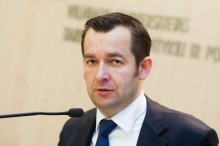In early October 2013, it will be a mid-term of the six month of Lithuania’s Presidency of the EU Council which started in July 2013. The lecture by Ramunas Vilpisauskas from the Institute of International Relations and Political Science, Vilnius University, will assesses the first months of this rotating Presidency, the main issues on the EU agenda as well as Lithuania’s potential to influence EU decision-making during its EU Council Presidency in two priority areas: energy policy, and EU-Eastern Partnership relations. It will discuss the factors of possible Presidency influence, reflecting on the Presidency’s roles and functions, how these roles changed with the Lisbon Treaty, and how the incumbent can use its position to increase its influence, also different national, issue- and context-related conditions for influence, and how they apply to Lithuania’s EU Council Presidency. The lecture will conclude with observations on the extent to which Lithuania fulfils national conditions for influence, what specific constraints are present in such issue areas as energy and Eastern partnership policies, finally, what is the policy context for advancing ambitious goals in these areas. There will be time after the talk for Q&A session.
Dr. Ramunas Vilpisauskas is a Director of the Institute of International Relations and Political Science, Vilnius University, since September 2009. He has worked for five years (2004-2009) as the Chief Economic Policy Advisor to the President of Lithuania H. E. Valdas Adamkus and the Head of Economic and Social Policy Group at the President’s Office. Since 2006 until the end of the term he has been the Coordinator of the advisory team of the President of Lithuania. He is also a Professor at the Institute of the International Relations and Political Science, Vilnius University.
Dr. Vilpisauskas will speak at CERES on 2 October, 2013. To attend, register here.
